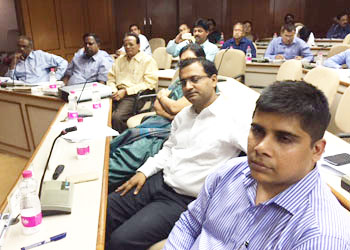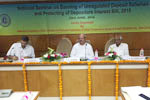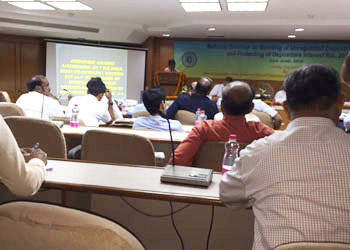More than 100 multi state cooperative societies from various parts of the country assembled in Delhi at NCUI’s headquarters to protest against what they call “strangulation of credit cooperative structure” in the country.
An Inter-Ministerial Group (IMG) has finalized a report according to which multi state co-operative and credit societies cannot accept deposits. The proposed bill calls for banning of Unregulated Deposit Schemes and Protection of Depositors’ Interests Bill (Banning Bill).
Offended at being compared with ponzy schemes in the wake of Shradha and other cheat fund frauds especially in the eastern part of India, the representatives one after other sought to draw the government attention to the basic difference between credit cooperatives and ponzy schemes.
Experts, in their lengthy speeches proved the fact that deposits are not unregulated in cases of credit cooperatives as there is duel control of Central Registrar as well as State govt. The very name of the Bill “unregulated deposits” fails to comprehend the reality of the sector. It is very well-regulated, they underlined.
Several of the big players of credit cooperatives with turnovers running into hundreds of crores made presentation before the gathered assembly expounding the basic principle of cooperatives. “We do not ask for any fund nor any support from the govt but to call us unregulated is a mockery”, said Sukesh Zamwar MD of Buldana which boasts of a business mix of Rs 10 thousand crore.
Govt is trying to implant a financial model in our economy from the speculative economies of USA and UK where as cooperative is based on solid and real economy, underlined Zamwar in his presentation.
The seminar was jointly organized by NCUI and NAFCUB as latter’s Chief Executive Subhas Gupta was full of praise for NCUI to have agreed to this seminar at such as short notice. “I would especially like to thank Mr Satyanarayan for his positive role”, he said.
Earlier, Mr D Krishan who is held as an authority in matters of cooperative banking expounded at length on the perils of such an act. Referring to ponzy schemes Krishna said there is no doubt that cooperative is the weakest chain in the financial system and ponzy scamsters try to exploit the loopholes. But there are just a handful of such cases and to have an overarching bill like this to control them would amount to missing the woods for the trees.
Our biggest strengthen is that the parent organization (Ministry of agriculture) has not accepted the bill and in fact has written against it, added Krishna.
OP Sharma, Founder of the Panipath Urban Co-op Bank, however, pointed out that merely protesting against the bill
Ram Prasad of Citizen Co-op Society from Hyderabad said that it is strange none of the stake holders- Nafcub, Agriculture ministry or credit cooperatives were involved in finalizing this bill. Referring to natural justice he said before capital punishment even a dreaded criminal is given a chance to explain; here we are being sacrificed even without getting a chance to put up our view.
D N Thakur, the Deputy MD of NCDC who joined the debate in the later half said that there seems to be some confusion over the issue and it would be fitness of things for NAFCUB to suggest the govt that it would act as extended arm for monitoring the cooperative credit societies. Give them some comfort level, Thakur added.

None of the top cooperators namely NCUI President Chandra Pal Singh Yadav or NAFCUB Chief Jyotindra Mehta were present on the occasion. They had however written letters to the Ministry expressing their anguish to the proposed bill in the past as carried in these columns.
